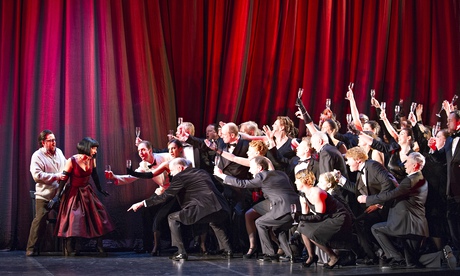
Go back to the material
It’s always worth reexamining the score, however many times you’ve performed it. As a conductor, there’s always something new to discover or something different to try: a new tempo, some different phrasing or articulation, a different orchestral sound. Conductors spend their whole careers getting to grips with pieces so one should never decide how a piece “goes” and then reproduce it over and over.
For example, Georg Solti used to buy a new full score of Beethoven’s 9th Symphony every time he performed it, so that he could relearn it each time. He conducted it for 50 years. Another wonderful example is Colin Davis at the Royal Opera House, who was conducting Così fan tutte right at the end of his career. Someone suggested a slightly unconventional change for it. Davis thought for a moment and said: “I’ve never done it that way but let’s try it!”
I’ve just conducted a revival of Porgy and Bess. In rehearsal the director and I turned to each other and said simultaneously: “this bit doesn’t work does it?” We ended up reinstating some cut material to improve the structure of the show, which really made a difference.
Energise the company
Opera companies often return to the same pieces but stamp out any feeling that a revival is routine. Every show should be created afresh, obviously within the structure of the original production. With singing, for example, that means thinking in detail about the music and your character. It can be harder for choruses to feel part of this process but they often appreciate it if you get them out of bad habits.
As a guest conductor it’s important to hold your own if people say: “but this is the way we have always done it.” Persuade, charm and be firm with them – whatever you need to do. I don’t suggest changing things for the sake of it but you should be true to your vision of the piece.
Rehearse
Make sure everyone commits to a proper rehearsal process. You will get less time than a new production but that time should be well spent. This is not always the case and it’s obvious in a performance when the singers have not spent any time in a rehearsal room together. The best performers never tire of exploring a character. Rehearsals are like training sessions in sport and you should not pitch up for a show without having put the hours in.
Talk
With repetition people can sometimes forget what they’re singing about, especially if it’s in a foreign language. Take the music away, speak the text through (in your first language if you like), then put the music back in. It’s a standard rehearsal technique that produces wonderful results, but people can be scared to use it.
Really listen
When you’ve worked on a piece for a long time it’s easy for the ears to switch off. Try to listen as if for the first time and ask questions: how is the phrasing in that section? Is the balance between orchestra and stage perfect? If you’re on tour ask: will this work in this venue? You should even ask: is that bit correct? I once heard a distinguished group playing a familiar piece and one person was playing in the wrong clef, ie the completely wrong notes!
Look after the orchestra
With a revival or a long run of shows the orchestra or band can feel disconnected from the creative process. Stay in touch with them; discuss any corners you weren’t happy with; call an extra rehearsal if you can. Write little notes and put them on their stands before the show – it’s a nice tradition that players appreciate. When I once did a very long run of performances I made sure I did this every week – there is always something on which to improve.
Make it sound new
It can be hard to make old pieces sound fresh and new, but they must. This is an important philosophical point: music doesn’t exist until it is performed, at which point it is fleetingly brought into life. It can be hard with very familiar pieces to give this sense of spontaneity – and there are many pieces I wish I could hear for the first time without the tradition/baggage they carry. But every so often a performance comes along that makes you reassess a piece completely. Those are the ones worth waiting for.
Tim Murray is a conductor – follow him on Twitter @TimMurray5
More like this
• How we made the Live/Revive/Lament opera performance app
• Why opera neglects its talent both on and backstage
• Opera as a learning tool
Join our community of arts, culture and creative professionals by signing up free to the Guardian Culture Pros Network.

